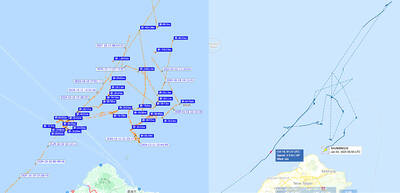A senior Chinese official responsible for Taiwan affairs yesterday reiterated Beijing’s insistence that the so-called “1992 consensus” is an important anchor for cross-strait peace and stability.
Over the past eight years, cross-strait relations have developed peacefully mainly because both sides established a common political foundation by “sticking to the 1992 consensus and opposing Taiwanese independence,” China’s Taiwan Affairs Office Minister Zhang Zhijun (張志軍) said.
The importance of the “1992 consensus” lies in the fact that it answers a fundamental question, that “the two sides of the Taiwan Strait are one country, rather than two,” Zhang said during a meeting with a Taiwanese delegation led by Chinese Nationalist Party (KMT) Vice Chairman Chen Chen-hsiang (陳鎮湘).
“Precedent has shown that sticking to such a political foundation allows continued healthy development of cross-strait ties,” Zhang said.
“Damaging the foundation will damage the fruit of peaceful development in cross-strait ties, leading to endless problems across the Taiwan Strait,” he said.
The “1992 consensus” — a term former Mainland Affairs Council chairman Su Chi (蘇起) admitted making up in 2000 — refers to a tacit understanding between the KMT and the Chinese Communist Party that both sides acknowledge there is “one China,” with each side having its own interpretation of what “China” means.
Since President Tsai Ing-wen (蔡英文) of the Democratic Progressive Party was sworn in, relations between the two sides have cooled, appaarently because she has refused to heed Beijing’s calls to accept the “1992 consensus” as the political foundation for cross-strait exchanges.
Zhang said Beijing has noticed that “some pro-Taiwanese independence forces are inciting hostility and confrontation between the people on both sides of the Taiwan Strait, severely worsening the atmosphere of cross-strait relations and affecting the peaceful development of cross-strait ties.”
However, despite the setbacks and risks in cross-strait relations, there is still hope, he said, without elaborating.

DEEPER REVIEW: After receiving 19 hospital reports of suspected food poisoning, the Taipei Department of Health applied for an epidemiological investigation A buffet restaurant in Taipei’s Xinyi District (信義) is to be fined NT$3 million (US$91,233) after it remained opened despite an order to suspend operations following reports that 32 people had been treated for suspected food poisoning, the Taipei Department of Health said yesterday. The health department said it on Tuesday received reports from hospitals of people who had suspected food poisoning symptoms, including nausea, vomiting, stomach pain and diarrhea, after they ate at an INPARADISE (饗饗) branch in Breeze Xinyi on Sunday and Monday. As more than six people who ate at the restaurant sought medical treatment, the department ordered the

A strong continental cold air mass and abundant moisture bringing snow to mountains 3,000m and higher over the past few days are a reminder that more than 60 years ago Taiwan had an outdoor ski resort that gradually disappeared in part due to climate change. On Oct. 24, 2021, the National Development Council posted a series of photographs on Facebook recounting the days when Taiwan had a ski resort on Hehuanshan (合歡山) in Nantou County. More than 60 years ago, when developing a branch of the Central Cross-Island Highway, the government discovered that Hehuanshan, with an elevation of more than 3,100m,

Taiwan’s population last year shrank further and births continued to decline to a yearly low, the Ministry of the Interior announced today. The ministry published the 2024 population demographics statistics, highlighting record lows in births and bringing attention to Taiwan’s aging population. The nation’s population last year stood at 23,400,220, a decrease of 20,222 individuals compared to 2023. Last year, there were 134,856 births, representing a crude birth rate of 5.76 per 1,000 people, a slight decline from 2023’s 135,571 births and 5.81 crude birth rate. This decrease of 715 births resulted in a new record low per the ministry’s data. Since 2016, which saw

SECURITY: To protect the nation’s Internet cables, the navy should use buoys marking waters within 50m of them as a restricted zone, a former navy squadron commander said A Chinese cargo ship repeatedly intruded into Taiwan’s contiguous and sovereign waters for three months before allegedly damaging an undersea Internet cable off Kaohsiung, a Liberty Times (sister paper of the Taipei Times) investigation revealed. Using publicly available information, the Liberty Times was able to reconstruct the Shunxing-39’s movements near Taiwan since Double Ten National Day last year. Taiwanese officials did not respond to the freighter’s intrusions until Friday last week, when the ship, registered in Cameroon and Tanzania, turned off its automatic identification system shortly before damage was inflicted to a key cable linking Taiwan to the rest of